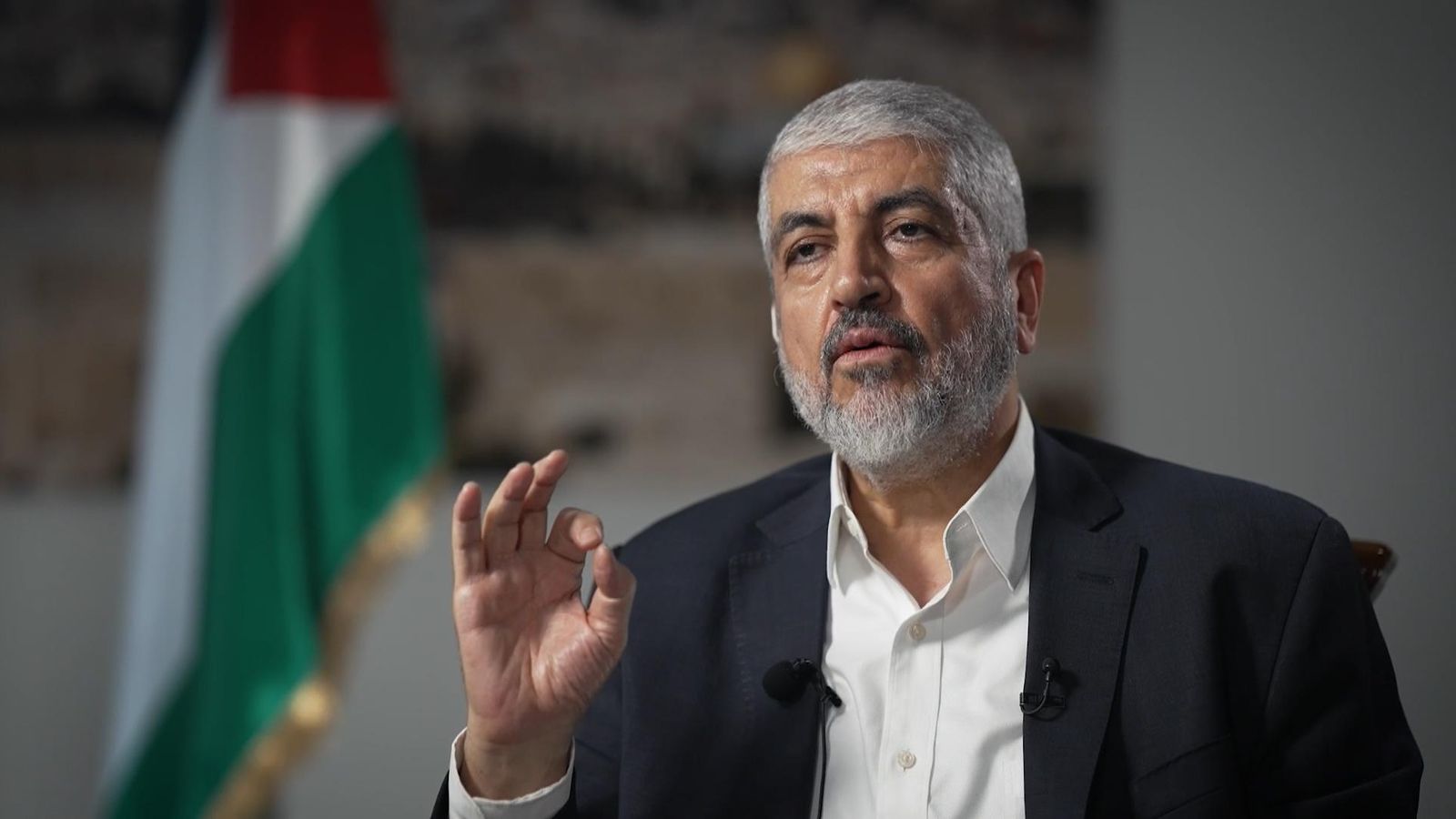WHO said on Tuesday that one-third of Gaza’s hospitals are non-functional.
A top Hamas official said the movement would be ready to release all captives from the 7 October operation if Israel halts its ongoing aggression on Gaza.
“Let them stop this aggression and you will find the mediators like Qatar and Egypt and some Arab countries and others will find a way to have them released and we’ll send them to their homes,” Khaled Meshaal, a key figure from the Palestinian resistance group, told Sky News on Monday.
The influential Hamas figure’s remarks were made as Qatar and Egypt managed to mediate the release of two additional female captives despite Israel previously refusing to receive them.
Earlier, Al-Qassam Brigades spokesman, Abu Obeida, named the two women as 79-year old Nurit Yitzhak and 85-year-old Yocheved Lifshitz. Their release came days after Qatari mediation resulted in the release of two other American captives, identified as Judith Raanan and Natalie Raanan—a mother and a daughter.
Yitzhak, who was seen shaking the hands of one of the Palestinian resistance fighters, told the press in Tel Aviv that Hamas had treated them “very nicely” and “took care of all their needs.”
“They took care of all the needs that women need, shampoo, conditioner,” she said.
The Al-Qassam Brigades—Hamas’ armed wing—had captured at least 200 Israelis, including members of the occupation forces, and a number of western citizens during the 7 October operation ‘Al-Aqsa Flood’.
The historic operation was an unprecedented attack on Israel, in which the Palestinian resistance group broke out from the besieged Gaza Strip and into occupied areas through air, land and sea attacks.
Israel has since used the operation as the pretext for its relentless bombardment of Gaza, where it has carried out numerous massacres on residential areas. Since the start of the war, the occupying forces have killed at least 5,087 Palestinians, including at least 2,055 children, though more than 1,000 are still believed to be trapped under the rubble.
The IOF also killed at least 22 of the captives, the majority of which are Israelis, Meshaal told Sky News.
“We want to stop the random bombardments, the total destruction, the genocide so that the al Qassam soldiers can take them [the captives] from their places and hand them to the Red Cross or whoever,” Meshaal said.
The Hamas official stressed that there is no change in the resistance movement’s “strategy and what happened on 7 October is completely” in line with its existing strategies. He maintained that the operation was carried out by Hamas, dismissing claims by the United States and other western governments that alleged the involvement of Hezbollah and Iran.
“The ones who kill women and children, mothers and fathers are Israelis,” Meshaal told Sky News.
Meshaal outlined two potential strategies to end the war.
“The exit can be in two stages. First regarding this current conflict, this criminal war on Gaza, the bombardment and aggression on Gaza should stop and Israel should cease forcefully removing the people of Gaza from the northern parts to the southern,” he explained, adding that “all crossing points should open, aid should be allowed to enter.”
“If this happens and there is a ceasefire we come to the big question what was the root cause of what happened and we will say it’s the occupation,” he said.
“So, Israel should withdraw from all occupied lands and we will have a window of opportunity and real opportunity,” he said. His comments appear to starkly contrast with those made by Israeli officials, all of which have pointed to a potential ground invasion.
On Tuesday, Israeli Chief of Staff Lieutenant-General Herzi Halevi said that they are “well prepared for the ground operations in the south”.
“We want to bring Hamas to a state of full dismantling,” Halevi said in a statement.
Humanitarian catastrophe
Gaza is currently witnessing a growing humanitarian catastrophe in light of non-stop Israeli bombardment as well as its complete siege on the Palestinian enclave.
The siege on the already blockaded city was announced on 8 October by Israel’s Defence Minister Yoav Gallant, preventing more than 2 million people from access to basic necessities, such as water and electricity. Announcing the full embargo, Gallant described locals in Gaza as “human animals”.
Gaza’s health sector has collapsed due to the lack of resources to treat thousands of injured, with witnesses on the ground saying doctors have been operating on patients without anesthesia.
The World Health Organization (WHO) said on Tuesday that one-third of Gaza’s hospitals are non-functional.
“We are on our knees asking for that sustained, scaled-up, protected humanitarian operation. We appeal to all of those in a situation to make a decision or to influence decision-makers to give us the humanitarian space to address this human catastrophe,” Dr Rick Brennan, WHO regional emergencies director for the Eastern Mediterranean region, said.
While around 37 tonnes of aid managed to cross over from Egypt to Gaza via the Rafah crossing this week, none contained fuel shipments. The limited aid has also been described by humanitarian agencies as “a drop in the ocean” of the needs of Gaza’s population.
Separately on Monday, the UN Relief and Works Agency for Palestine Refugees (UNRWA) warned that the absence of fuel will force humanitarian response to stop.
“In three days, UNRWA will run out of fuel, critical for our humanitarian response across the Gaza Strip,” Philippe Lazzarini, UNRWA’s Commissioner-General, said in a statement.
He added: “Without fuel, there will be no water, no functioning hospitals and bakeries. Without fuel, aid will not reach many civilians in desperate need. Without fuel, there will be no humanitarian assistance. No fuel will further strangle the children, women and people of Gaza.”
At least one million people in Gaza have been internally displaced since the beginning of the war, the United Nations said on Saturday.







